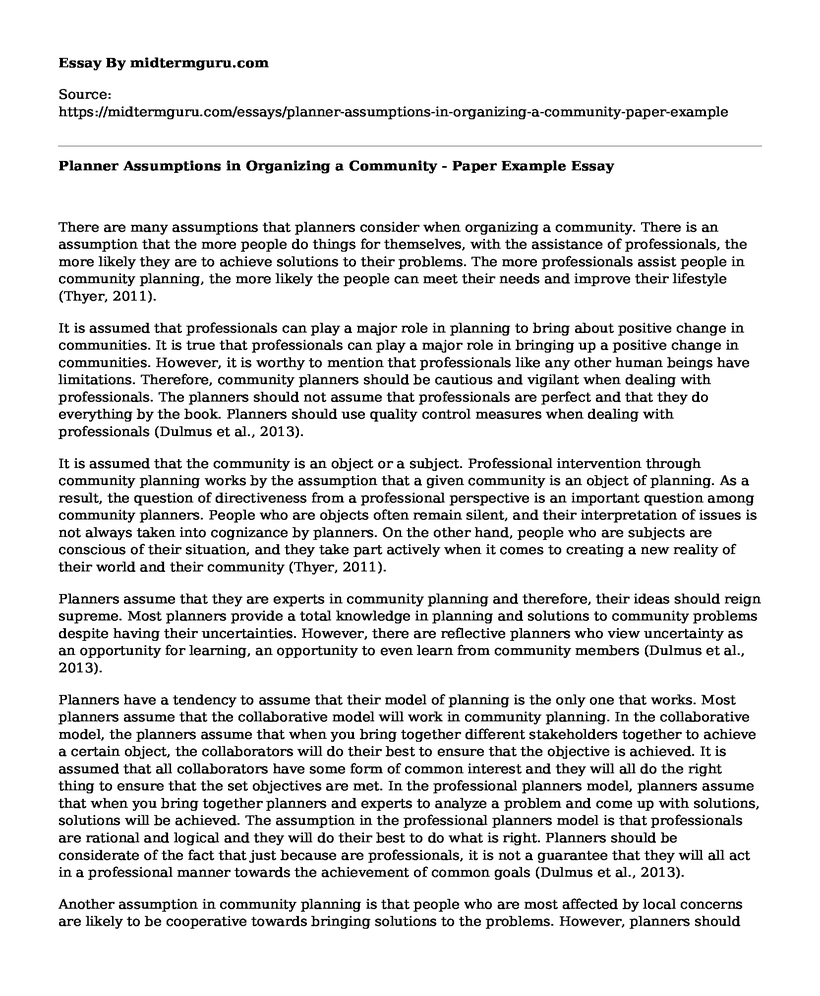There are many assumptions that planners consider when organizing a community. There is an assumption that the more people do things for themselves, with the assistance of professionals, the more likely they are to achieve solutions to their problems. The more professionals assist people in community planning, the more likely the people can meet their needs and improve their lifestyle (Thyer, 2011).
It is assumed that professionals can play a major role in planning to bring about positive change in communities. It is true that professionals can play a major role in bringing up a positive change in communities. However, it is worthy to mention that professionals like any other human beings have limitations. Therefore, community planners should be cautious and vigilant when dealing with professionals. The planners should not assume that professionals are perfect and that they do everything by the book. Planners should use quality control measures when dealing with professionals (Dulmus et al., 2013).
It is assumed that the community is an object or a subject. Professional intervention through community planning works by the assumption that a given community is an object of planning. As a result, the question of directiveness from a professional perspective is an important question among community planners. People who are objects often remain silent, and their interpretation of issues is not always taken into cognizance by planners. On the other hand, people who are subjects are conscious of their situation, and they take part actively when it comes to creating a new reality of their world and their community (Thyer, 2011).
Planners assume that they are experts in community planning and therefore, their ideas should reign supreme. Most planners provide a total knowledge in planning and solutions to community problems despite having their uncertainties. However, there are reflective planners who view uncertainty as an opportunity for learning, an opportunity to even learn from community members (Dulmus et al., 2013).
Planners have a tendency to assume that their model of planning is the only one that works. Most planners assume that the collaborative model will work in community planning. In the collaborative model, the planners assume that when you bring together different stakeholders together to achieve a certain object, the collaborators will do their best to ensure that the objective is achieved. It is assumed that all collaborators have some form of common interest and they will all do the right thing to ensure that the set objectives are met. In the professional planners model, planners assume that when you bring together planners and experts to analyze a problem and come up with solutions, solutions will be achieved. The assumption in the professional planners model is that professionals are rational and logical and they will do their best to do what is right. Planners should be considerate of the fact that just because are professionals, it is not a guarantee that they will all act in a professional manner towards the achievement of common goals (Dulmus et al., 2013).
Another assumption in community planning is that people who are most affected by local concerns are likely to be cooperative towards bringing solutions to the problems. However, planners should not forget that in reality, it is impossible for everyone to be cooperative towards developing solutions to the problems. In every community, there are wicked and malicious individuals who would not like to see any progress being made. Therefore, planners should not be naive in thinking that all people in a given community will be supportive of them in trying to find solutions to the problems that the given community contends with (Thyer, 2011).
References
Dulmus, C. N., Sowers, K. M., & Glisson, C. A. (2013). Social work practice with groups, communities, and organizations: Evidence-based assessments and interventions. Hoboken, N.J: Wiley.
Thyer, B. A. (2011). Comprehensive handbook of social work and social welfare: Volume 2. Hoboken, N.J: John Wiley and Sons.
Cite this page
Planner Assumptions in Organizing a Community - Paper Example. (2021, Jul 05). Retrieved from https://midtermguru.com/essays/planner-assumptions-in-organizing-a-community-paper-example
If you are the original author of this essay and no longer wish to have it published on the midtermguru.com website, please click below to request its removal:
- Articles Analysis on Changes in Healthcare - Paper Example
- Paper Example on Project Management Tools
- Paper Example on Abilene Paradox and Group Think
- Paper Example on Leadership: Keirsey Temperament Sorter
- Essay Sample on Roles and Responsibilities of the Project Board
- How Has the Role of the Strategic Planner Changed Over the Past Few Decades? - Essay Sample
- Bad Leadership, Government and Administration - Case Study







